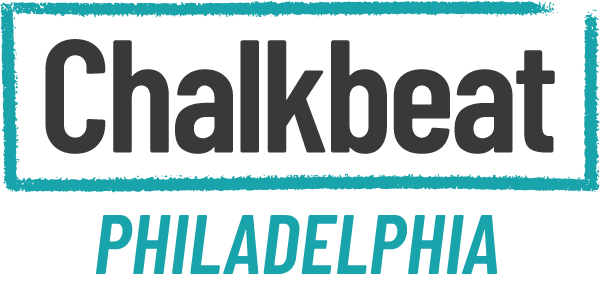
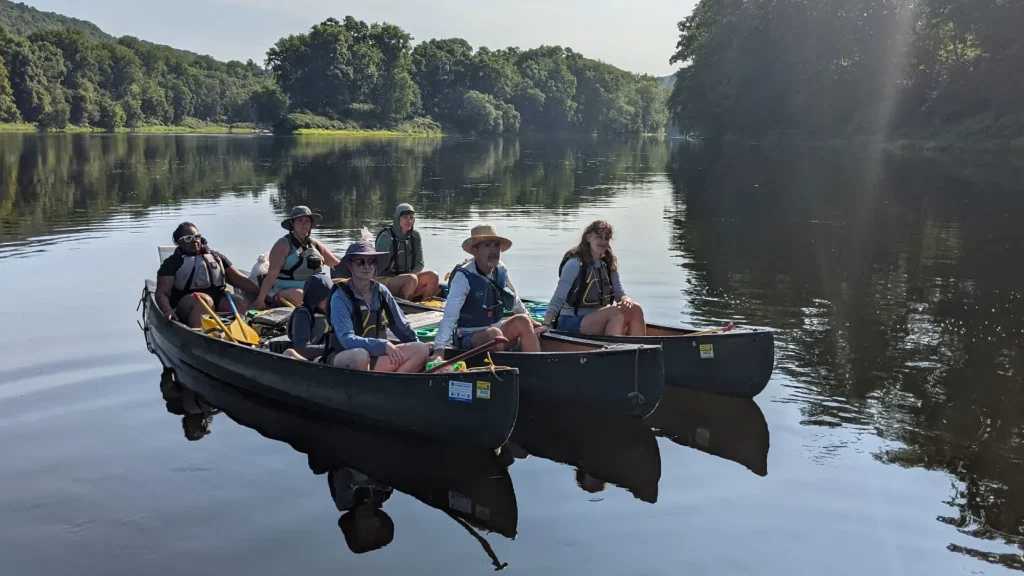
By Carly Sitrin Sept 11, 2023
In the waning days of summer, a group of Philadelphia teachers gathered on the banks of the Delaware River for an exercise in teamwork — and geometry.
Their assignment: Determine the width of the river they would be canoeing on for a week.
The catch: They’d have no tools or instruments to measure it with.
“I gave them a few hints, because they’re not actually in 10th grade geometry class,” said Bridget Donegan, who teaches math and science at Swenson Arts and Technology High School in Northeast Philadelphia — nearly 90 miles away from their campsite in the Delaware Water Gap — and led the exercise.
Donegan and her fellow educators came from schools across the city, from traditional district classrooms to vocational technical high schools, to participate in a weeklong educator expedition program through Philadelphia’s Outward Bound School.
The days were for outdoor adventures, such as canoeing and rock climbing. In the evenings, they reflected, gathering around a campfire to share their insecurities and hopes for the coming school year.
The program is intended to foster teamwork and forge stronger community bonds among teachers working in the city, in addition to developing “experiential education skills” that they can take back to their classrooms, according to Philadelphia Outward Bound School spokesperson Chris Richter.
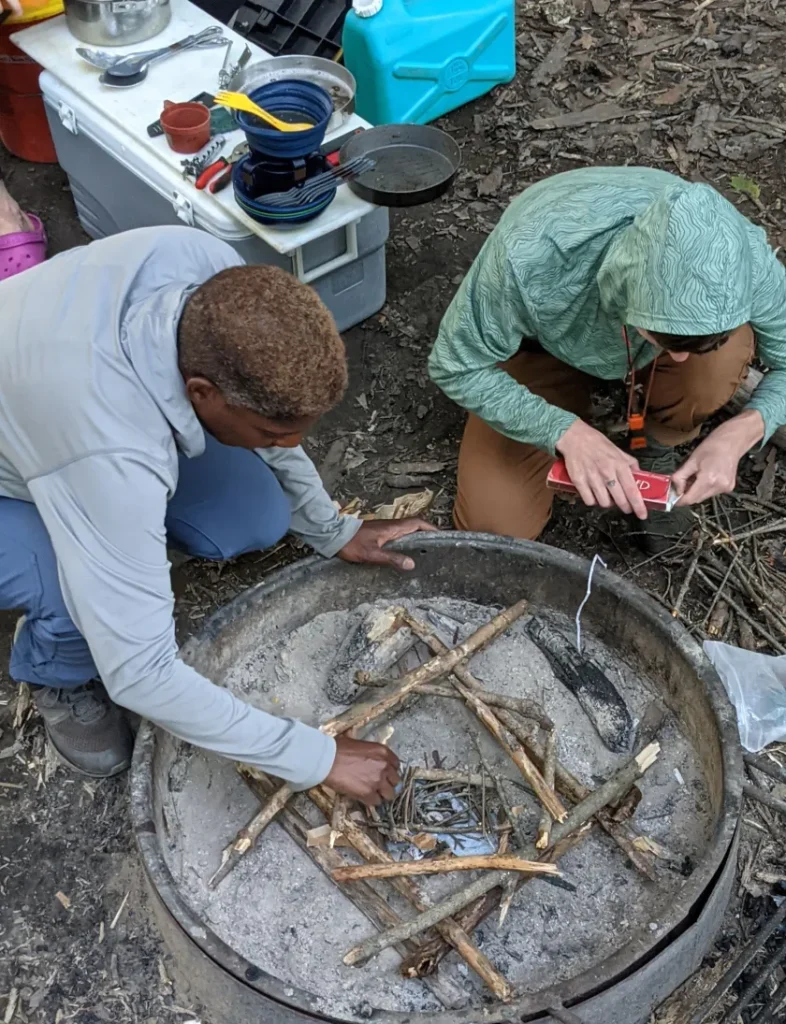
On this trip, Donegan and her peers would be both students and teachers — following safety guidelines from their Outward Bound facilitators, but also leading small group lessons about topics they’re passionate about. They instructed each other in American sign language, deep breathing techniques, yoga, and education-specific lessons on classroom techniques like “mutual learning” and “consultancy protocol.”
And, in Donegan’s case, high school geometry.
POBS, as it’s known, also offers similar trips for students, district staff, and members of the public. Outward Bound’s programs have long been known for giving city dwellers the chance to camp, hike, and canoe and build practical skills like knot-tying.
But the programs have taken on a new weight after a series of difficult years for Philadelphia students and their teachers. Rising rates of gun violence, sudden school closures due to asbestos, lingering COVID traumas and environmental crises have exacted an emotional and academic toll on school communities.
And the school district is looking to POBS as a potential aid.
“In Philadelphia, our district is tremendously impacted by trauma,” said Abigail Gray, deputy chief of the district office of school climate and culture. “With the increase in gun violence that we’ve seen in the city in the last few years, we need ways to get away from that and take a break and have positive experiences and have fun, and that goes for certainly our students, but also for our staff. They are confronted with really difficult stuff, day in and day out, all day long.”
Cheers follow a tough climb
Gray said she has taken her team of 75 district staffers out to complete rope courses and participate in team building activities designed by POBS to merge professional development with practical skills.
No two POBS trips are identical. The educator expedition course is six nights and seven days of canoeing on the Delaware River. Some student trips are shorter, some are daylong experiences, and others are only a few hours.
The educator course is fully paid for by POBS, but teachers are expected to contribute a $250 application fee, according to Richter.
A staple activity of the expeditions is the “goal pole” where participants hold onto a series of ropes and support one usually nervous person at a time as they clamber up a 30-foot telephone pole. After reaching the very top, they are encouraged to jump away from the pole and grasp for a thick woven rope hanging above all of their teammates.
Once a teammate leaps, those holding the ropes gently lower them to the ground, cheering words of encouragement and whooping with pride when they touch down.
No one has to jump, and in fact, some feel the challenge without touching the top of the pole. No matter how far a teammate climbs, their colleagues are generous with their hugs and reassurances.
What’s important is not how far up the pole you made it, the educators explained. It’s the fact that you tried and trusted your colleagues to keep you from falling.
“We cannot do our work if we don’t have good relationships with one another and good communication with one another, and if we don’t have good communication and relationships with the schools that we support,” Gray said of her central office staff.
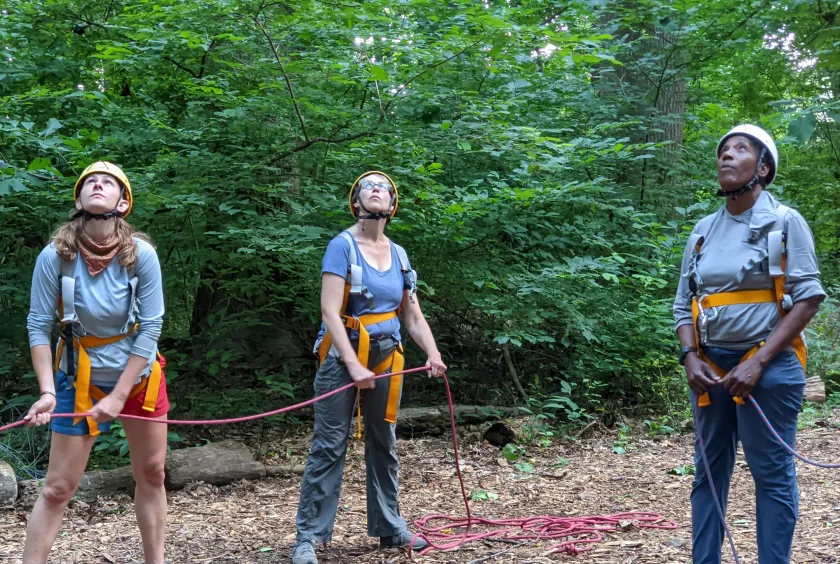
Unexpected moments help build community
The educators first met their fellow participants at the Discovery Center in Philadelphia’s Fairmount Park where they went through what POBS staff call a “duffle shuffle.” All of their clothes, backpacks, and camping gear were brought out for inspection, and anything lacking was provided from POBS’ store of water bottles, rain pants, sleeping bags, wool socks, and other camping necessities.
The crew then set off in a van for their expedition. They camped in the wilderness at different sites along the river bank each night, sleeping in tents together and operating as a “crew, not passengers,” as Richter put it. That meant distributing roles and responsibilities throughout the week, including “leader of the day,” navigator, chef, cleanup crew, medic, environmentalist, and journalist — in charge of the camp camera.
For Glennis Johnson, a social studies and learning support teacher at Swenson, the practice of teaching and learning in a group of interested peers was an important — and refreshing — experience.
She said she also learned a lot from the Outward Bound instructors guiding them, Kim Glodek and Jennifer Raymond, who are educators in their own right.
Johnson said the instructors’ willingness to leave them on the river bank during “critical moments to figure it out,” helped her get a better sense of what her students may be feeling during challenging lessons.
“That’s something that I need to work on as a teacher,” Johnson said. “Creative struggle is so important … meeting people where they are …. letting them show you their good positive sides.”
Jennel Johnson (no relation to Glennis) is the finance administrator for POBS and a Philly native who once taught undergraduate accounting. She went on her first big overnight trip with the classroom educators.
At one point early in the trip, their boat hit rocky waters and tipped over on the river. Luckily, Johnson said, it happened the day after their instructors told them just what to do in such a situation.
“Everyone jumped right in, and did what we practiced the day before,” Jennel Johnson said.
Sometimes, she said, it was not the planned team-building activities but rather the unexpected moments that brought them closer together.
“We bonded over wet clothes and Swedish Fish,” she said.
Raymond, one of the POBS instructors and the scholarship and recruitment manager for the organization, said it’s always a powerful experience watching a group of strangers learn to trust each other — essentially with their lives — over the course of an expedition.
She said listening to the educators in their downtime talk through their emotions and share resources and ideas for classroom support was inspiring. She hopes it will influence the way she works with students in the future.
But even as the teachers helped each other navigate social and emotional struggles, Raymond said part of the trip is also allowing them to act like kids again.
“Even though they were adults, they were like high school teenagers. You know, you have to say, ‘Hey, it’s time to go. It’s time to wake up,’” Raymond said. “Being out there took them back to that place.”
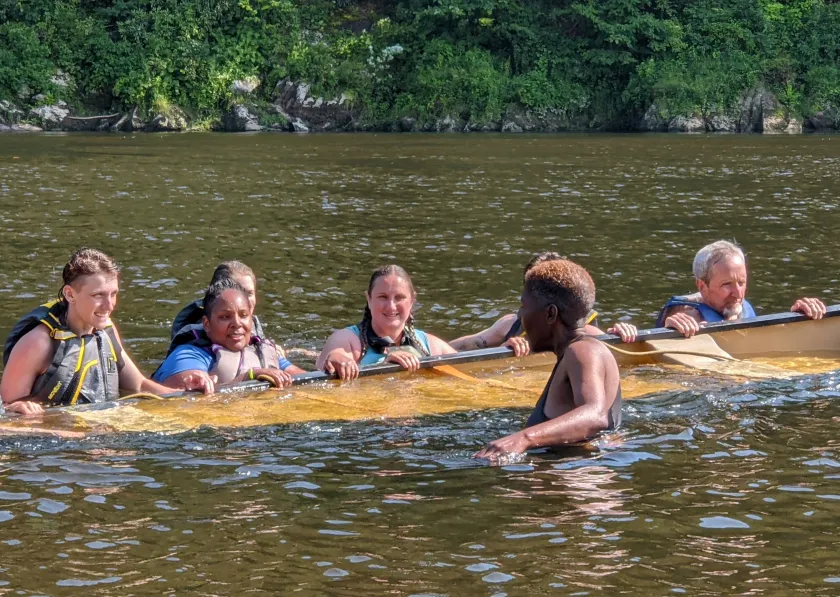
How the program works in Philly
The POBS network launched 30 years ago with the goal of giving Philadelphia students leadership skills and improving their conflict resolution abilities. It’s part of a national network of 10 Outward Bound schools in the U.S
Maurice West, a climate manager at W.D. Kelley School, said every year the school brings students to POBS in the hopes of shoring up their leadership abilities and socialization skills, and giving them an opportunity to ditch their phones and talk to one another.
“This is the best thing ever for our children,” West said. “They learn conflict resolution skills … It’s in the city but it’s out of the city.”
Nancy Goldenberg, who was POBS chairperson in 1993 when the first expedition set off, said at the time that the program was “meant to become integrated into each school’s basic curriculum and ultimately, become an integral part of school reform and improvement underway in the Philadelphia public school system.”
POBS leads 5-day canoe or backpacking expedition courses with middle school and high school students during the fall and spring seasons, similar to what the educators experienced. But its vision of incorporating these trips into each school’s curriculum hasn’t materialized.
In 2022, POBS served 40 district middle and high schools and 2,978 students at those schools. It also worked with four charter schools and their 1,104 students, according to Richter.
In 2023, Richter said, POBS has scheduled trips and outings through November and is expected to serve 42 district schools and around the same number of students as the previous year.
That’s a small fraction of the 177,941 district and charter school students in the city, but Richter and Glodek, the POBS director of education and partnerships, said they are looking to expand.
One impetus for that is what program leaders see as the potential to make a difference in students’ mental health.
To study the impact of their programs, POBS administered two versions of a survey to 347 participating students between January and November 2022. The survey asked students to rate their perception of themselves on 12 social-emotional skills, before and after they went on an expedition: assertiveness, emotion control, empathy, learning interest, perseverance, and teamwork, group relationships, physical confidence, responsibility, self-awareness, self-regulation, and staff and student relationships.
Preliminary results indicated that after a POBS trip, students reported statistically significant positive change in all but one of those areas: “emotion control.”
But some of the effects aren’t measurable by a survey.
Chalkbeat shadowed some of the students who took POBS trips with their schools in late May.
Mykina Simmons waited anxiously at the Discovery Center in Fairmount Park to hug her daughter Monae Simmons, an eighth grader at W.D. Kelley school who was returning from a POBS expedition with her classmates.
“I was living vicariously through her,” Simmons said. “The closest thing I’ve ever had to this trip was when my dad pitched us a tent in the backyard,” she said.
Simmons was also a student at W.D. Kelley, and she said she wants all four of her kids to have the outdoor experience she never had.
“S’mores, beans in the pot … stuff you see in the movies.” Simmons said.
Bringing the backwoods lessons to the classroom
While there’s no survey data on the educators’ experiences, many who went on the recent expedition said they’re excited to bring the lessons they learned to their classrooms.
Alex Volin Avelin, who taught in the Philadelphia school district for 22 years and now works for the district as a “consulting teacher” helping coach new educators said she did the educator course for the first time nine years ago. At that time, she said she was excited to hike and canoe and experience the outdoors. She said she didn’t realize how much emotional processing and team building would be involved.
“I was super impatient with it,” Volin Avelin said.
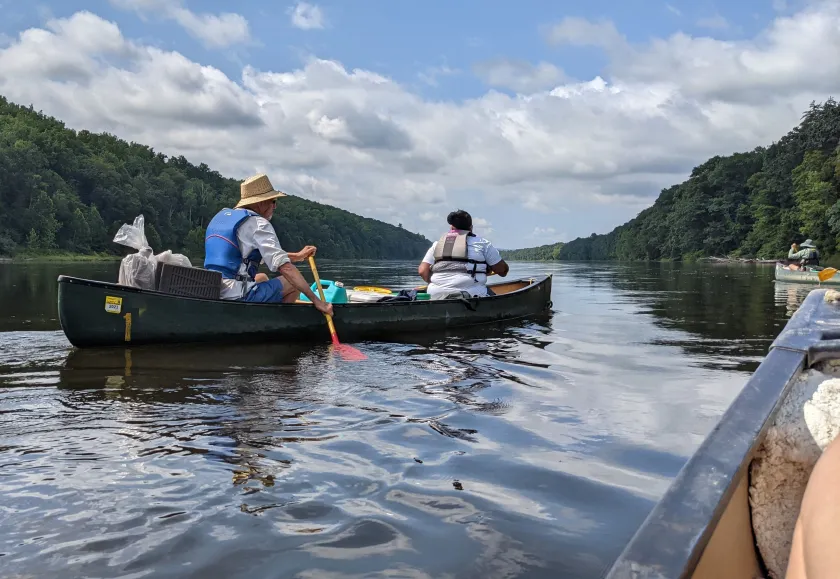
For this trip, she said, she was determined to open up to her fellow crew members, but also to take in the techniques Raymond and Glodek were employing to coach the educators and bring those to her work with first time classroom teachers.
Johnson, the finance administrator for POBS, said she’s eager to share what she learned with her teenage nieces and nephews in the city.
“They’re under so much pressure,” Johnson said, from the gun violence and the distractions of social media. She sees POBS as something that could “take them away from that every day, give them something to do that’s positive.”
“There’s so much more world to explore,” Johnson said. “Even if it’s just two to three hours away from your neighborhood.”
The width of the river: ‘They figured that out’
At the Delaware Water Gap, where the river carves through a densely forested ridge, Donegan’s geometry lesson was in session.
Ultimately, there are a couple of ways to solve the measurement problem, Donegan said. But the way the educators figured it out was to stand somewhere on the riverbank, look directly across the river and pick an object to focus on. Then they walked along the bank until that object looked like it was at a 45-degree angle from them.
“If you do that, then you have essentially a right triangle with two legs that are the same length,” Donegan said.
In other words, an isosceles right triangle, a concept she’s trying to teach to her 10th grade geometry students.
Without instruments to check their work, they relied on their calculations — and the guidance of their math teacher. They concluded the river was around 225 feet across.
“Collectively, they figured that out, and they taught each other, which is 100% what I want to happen in my classroom,” Donegan said. “Occasionally if I’m very, very lucky, it does happen.”
